Tassie nurse one of thousands unable to administer Covid-19 vaccine due to current rules
A Tassie nurse is one of thousands of highly-skilled medical professionals across Australia eager to give doses of the Covid-19 vaccine amid a troubled nationwide rollout. LATEST >>
Tasmania
Don't miss out on the headlines from Tasmania. Followed categories will be added to My News.
- ‘He’s a fighter’: Tassie rallies around beloved footy player
- ‘I was asleep’: Woman breaks down during sexual assault trial
CYGNET’S Kerrie Duggan is one of thousands of highly-skilled medical professionals across Australia eager to give doses of the Covid-19 vaccine amid a troubled nationwide rollout.
But Australian nurse practitioners say they are being excluded, and that their pleas to the federal government for a rethink of current rules are falling on deaf ears.
Nurse practitioners are nurses with a graduate degree in advanced practice nursing but under the rollout, they are only able to administer the vaccine if supervised by a general practitioner or other suitably qualified health professional.
Those working outside the public health system were not covered by the Medicare benefits schedule for the vaccines, meaning they could not get a rebate.
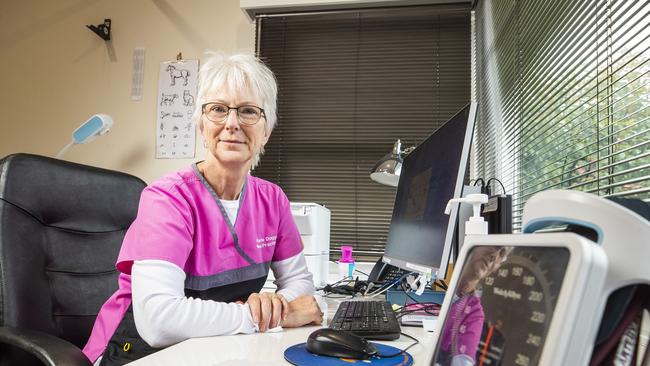
Ms Duggan, also the part-owner of the Cygnet Family Practice, said she could not understand why professionals like her were being excluded.
“It makes total logical sense to enable a nurse with advanced skills and qualifications to be part of this rollout. There is no reason we should be excluded,’’ she said.
Ms Duggan believed as many qualified professionals as possible should be engaged to take part in the rollout.
“In this community, in any community in Australia, it would mean more people would get vaccinated more quickly,’’ she said
“We’ve got nurse practitioners in rural and outback Australia that can’t immunise their population, because the federal government hasn’t given us a Medicare item number and we are not authorised to give the vaccine.”
The Cygnet practice has been administering the Covid-19 vaccine to patients since March, but she said the number of doses could increase greatly if nurse practitioners could be involved.
Australian College of Nurse Practitioners president Leanne Boase said these professionals could prescribe and administer vaccines and played a major role in healthcare delivery, especially in rural and remote areas.
Ms Boase told the Australian Nursing and Midwifery Journal this month that there was “absolute disbelief and disappointment” from nurse practitioners at being shunned.
She said she suspected the absence of nurse practitioners from the vaccine rollout reflected a broader lack of recognition of the profession.
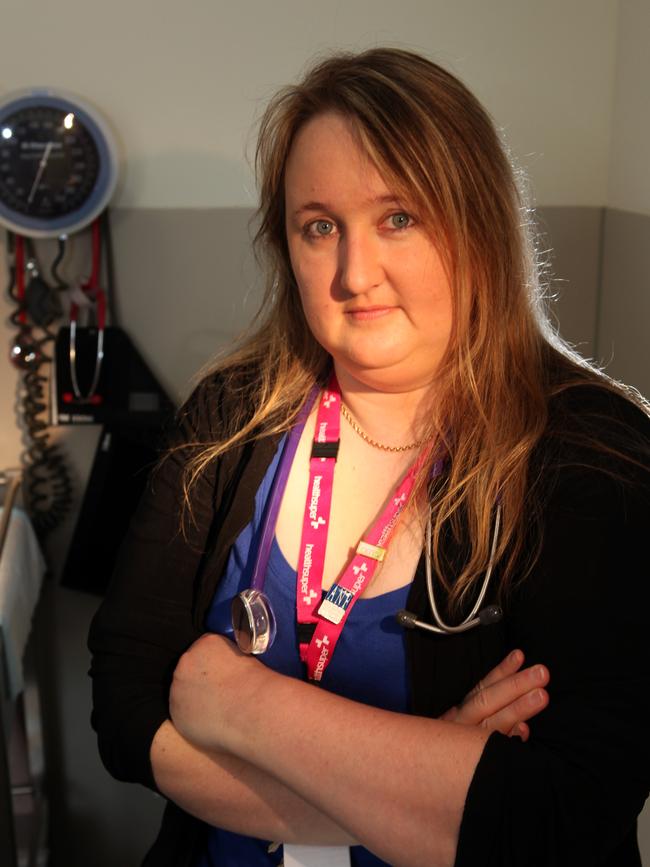
A federal health department spokesman said nurses were fundamental in the “unprecedented” Covid-19 vaccination effort.
“Models of vaccine delivery vary in each location based on local patient and workforce needs,’’ he said.
“Eligibility to administer the vaccines is determined by jurisdictional legislation and requirements.”
The spokesman said chief nursing and midwifery officer, Adjunct Professor Alison McMillan, had engaged with the nursing and midwifery professions throughout the pandemic.
Compensation offer for closed businesses
PREMIER Peter Gutwein has apologised to Tasmanian businesses forced to close abruptly on Saturday due to a Covid-19 testing blitz brought on by a Launceston healthcare worker who tested positive to the virus overseas three days after leaving the state.
One-off payments of up to $250 will be made available to workers affected by the shutdown and told to isolate, while businesses are also in line for financial support due to their closure.
Many smaller businesses had no option but to shut their doors, with some having already opened for the day, only to be told their premises was a possible exposure site.
The traveller, a man, had worked his last shift at the Launceston General Hospital on June 20, before visiting several locations in the state’s North and South-West and in the Huon.
He returned a negative test for Covid-19 in Tasmania on June 30, before travelling to Melbourne on July 2, then on to Singapore and London and it is on one of these long-haul flights where it is believed he was most likely infected.
The man tested positive in the UK on July 4 and Tasmanian authorities are working backwards to investigate the possibility he was either infectious while in Tasmania or caught the virus from someone in the state.
There is currently no evidence to support either of these scenarios.
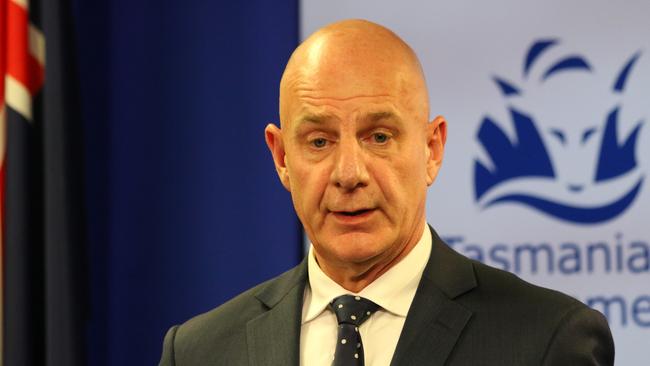
Tasmanian contact tracers had a three-hour phone call with the man from the UK on Friday night before finalising the list of 34 possible exposure sites on Saturday morning.
Mr Gutwein said Tasmania’s response was being done out of an abundance of caution and the risk to the state was considered low, and he apologised to affected businesses.
“It’s unfortunate if not every business was contacted before their opening hours this morning and to be frank, I’d apologise for that,’’ he said.
“But at the end of the day, we’re working through this as quickly as we possibly can.”
The Premier said he personally spoke with three affected business owners over the phone, who he said were broadly supportive of the measures taken by Tasmanian officials.
“This is not a time for alarm, but what it is, is a very clear reminder of the challenges that we face both here and across this country,’’ Mr Gutwein said.
“The steps that we are taking are designed to ensure that we have a very good understanding of whether or not we have any Covid here in Tasmania.”
Public Health Director Mark Veitch said health officials were undertaking the surveillance “so we are covering all bases”, and that the advice would affect several hundreds of people, but not in the thousands.
“We’ve seen what a terrible situation that people can get into in the space of weeks if there are missed chains of transmission in the community. We don’t want that to happen here,’’ he said.
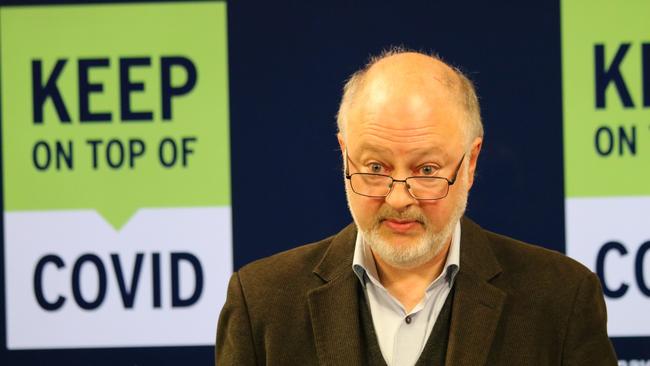
Dr Veitch said up to 2pm on Saturday, 772 tests for Covid-19 had been done in Tasmania, 210 of those in Launceston, with more bookings through the afternoon.
Tests were expected to be returned over the weekend, which he hoped would confirm no cases of the virus in Tasmania.
Dr Veitch said the delay in notifying some businesses came because authorities wanted to be certain the information about exposure sites was correct.
“I’m not particularly concerned that there’s a high risk from a business opening (on Saturday),” he said.
“I know that they might feel uncomfortable, but I think that they can be reassured that what we’re doing is very precautionary.”
Mr Gutwein said affected businesses would be contacted by the government on Monday to discuss what support they required as a result of being forced to close.
Staff are able to return to work once they have returned a negative test, and are not required to quarantine for 14 days.
Affected businesses are not required to undergo deep cleaning.
The full list of exposure sites is available here or at www.coronavirus.tas.gov.au, with anyone at the locations at the specified dates and times urged to isolate and get tested.
To arrange a test, phone the Public Health Hotline on 1800 671 738.
‘No idea’: Cafe in the dark over Covid exposure
The owner of Maydena’s Fika Time Café and General Store only knew that her shop had been visited by a Launceston health care worker with Covid was when she was contacted by the Sunday Tasmanian.
Jeanette Callow said she had no idea she was on the Public Health list of venues visited by the man who tested positive in London.
“I read about [him] but had no idea he came here, that’s a bit of a surprise,” Ms Callow said.
“I tried to see if they had put up the list before I came to work at 7 o’clock this morning but it wasn’t there and I don’t have access to my computer at work.
“That’s a bummer really, I will have to ring Public Health and see what I have to do.”
The man visited the café on June 26 between 11am and 11.15am.
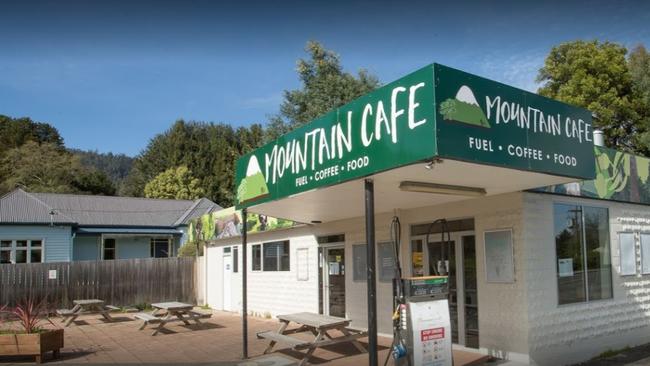
Ms Callow said she was unsure how busy she was that day or whether she had an assistant working with her.
“I’ll look at my transactions for the day. Some Saturdays are busy and some can be very slow,” she said.
“If we have to close that will be hard because we’re the only place you can get petrol for a fair way.”
Saint John Craft Beer owner Tim Jarosz said 12 of his staff had been tested on Saturday morning and were awaiting results.
“At the time that it related to we had quite a lot of staff on site, it was one of the staff’s birthdays and the staff had come together to celebrate.
“One of the chefs had also come in on his day off to look at an oven that was playing up,
“A few things came together, in a normal environment only about five staff would have been impacted,” he said.
Mr Jarosz said the lunch-time food service on Saturday was cancelled, with a limited dinner menu offered because there weren’t enough chefs to provide the full service.
He said they were contacted by Public Health late on Friday night and were able to rearrange rosters to ensure they could open the next day and was hopeful things would be running as normal next week.
Local businesses classified as Covid-19 exposure sites need to exercise caution and seek advice from public health authorities if they’re unsure of their circumstances, Launceston Mayor Albert van Zetten says.
Anyone who was at any of the sites at a particular time is required to immediately self-isolate, book a Covid test and continue isolating until a negative result is returned.
There have been reports of some businesses closing their doors as a result of the advice but Cr van Zetten said he wasn’t aware that had occurred.
“I would assume they’re taking precaution, trying to protect their customers as well - just in case,” he said. “I mean, that’s what people need to do.”
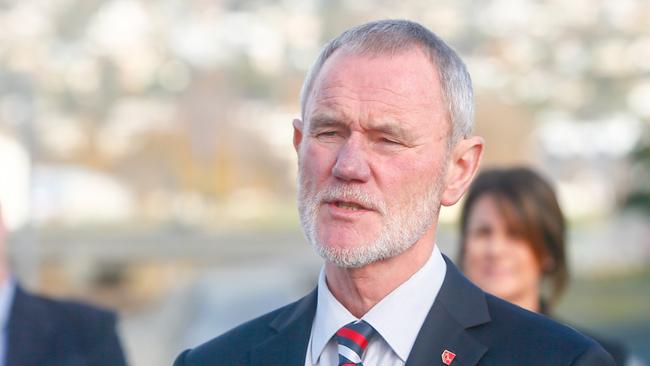
“They’ll probably go and get tested and if that’s all clear they can open again next week.
“(Businesses) have got to follow the advice of Public Health. If they’re not sure (what to do), they’ve got to get in touch with Public Health and follow their advice.”
Bass Labor MHA Janie Finlay said it was imperative that people followed the public health advice to protect the broader community.
“We don’t want this to get a hold in Tasmania,” she said.
“Our community has been great at following health advice and we’re asking that again now.
“If you were at one of the exposure sites during the documented times, make sure you go and get tested.
“Our community and our businesses need us all to keep on top of this and following health advice.”
Testing boom to follow positive UK Covid case with Tassie link
UPDATE, July 9, 2021:
HUNDREDS of Tasmanians are expected to be ordered to get tested amid a contact tracing puzzle linked to a positive Covid-19 case of a Launceston healthcare worker now in London.
Health authorities will on Saturday release a list of sites visited by two healthcare workers prior to their departure from Tasmania, with those who were at the locations at certain times asked to isolate until returning a negative test.
Premier Peter Gutwein and Public Health Director Mark Veitch said the action taken by the state was being done out of an abundance of caution and that the risk was deemed very low.
But they could not rule out the possibility, unlikely as it may be, that the traveller acquired the infection in Tasmania, as they probe the complex set of circumstances.
Dr Veitch said the traveller had worked their final shift at the Launceston General Hospital on June 20, before visiting many locations around Tasmania with their travelling companion.
Both travellers then returned a negative Covid-19 test result following a sample on June 30, before staying with two friends in Launceston, who are now in quarantine and returned negative tests.
On the morning of July 2, they flew to Melbourne, then on to Singapore, before arriving in London on July 3, with one of them testing positive to Covid-19 following a test the next day.
Both had been vaccinated in Tasmania with the Pfizer vaccine during March and April.
Dr Veitch said the most likely explanation was the traveller had acquired the infection on one of their long-haul flights, or less likely that they caught the virus after arriving in London.
Another possibility, albeit less likely again, was a false positive test in London, as was a false negative from the test in Tasmania on June 30.
“If those circumstances which I think are most likely are the case, there’s no risk at all to Tasmanians, because these people have not been infectious while they’re in Tasmania,’’ Dr Veitch said.
“The possibility though that I want to keep in mind is, could these people have been infectious during their movements around Tasmania before they left?
“What we’re trying to do in doing that testing is trying to identify whether there is someone out there that could have infected these people.”
Public Health officials were told about the positive case on Thursday morning and have since been working on a list of places visited by the travellers between June 23 and July 2.
The time zone difference means they are still in the process of clarifying dates and times before releasing the information to the public.
Dr Veitch said there were a number of premises in Launceston and in other parts of the state, with anybody who had been at the locations on the specified dates, to isolated and get tested.
He said the advice could mean around 200 to 300 people may be asked to isolate.
Mr Gutwein said authorities were exercising a high level of caution.
“If you step through where this is at, and put it into context, you can understand just how cautious we’re being,’’ he said.
“There is a very very small risk that Public Health are looking to work through and identify whether or not it exists at all.”
The Premier said ongoing wastewater treatment testing being done in Tasmania had continued to produce negative results, which provided some confidence there was not undetected Covid-19 cases in the community.
Meanwhile, Tasmania will remove a travel ban on those from the Queensland areas of Brisbane and Moreton Bay, following the lifting of restrictions for a further 11 Queensland local government areas earlier this week.
High-risk declarations remain in place for Greater Sydney and other parts of NSW as that state continues to battle to get on top of an outbreak linked to the Delta strain of the virus.
Tassie ready for ramped up vaccine blitz
July 6, 2021:
WORKPLACES could be turned into vaccination centres and medical students may be recruited to help administer the jab as the federal government attempts to meet its goal of offering a coronavirus vaccine to everyone who wants one by the end of the year.
And Tasmanian health authorities say they are prepared for the increased workforce required to cope with an escalation in the vaccination rollout effort.
Lt Gen John Frewen — who was brought in last month to head up the revamped Covid vaccination program — spent much of Tuesday conducting “war game” scenarios with the states and territories where everything from supply issues to tropical weather events were canvassed as the nation prepares to “sprint” towards the end of the year.
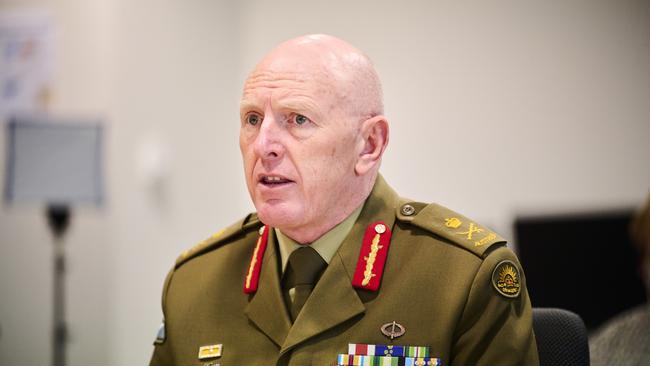
However, Lt Gen Frewen admitted some parts of the program had not gone to plan, and warned that supply issues could still affect the government’s goals.
“This is an ongoing program. some parts will go more quickly than others, and as we get more deeply into the program we need to monitor it very carefully,” Lt Gen Frewen said.
“When we get to September and October, if we’ve got the amounts of supply that we are forecast to have at those stages, that’s around about the time we may be able to look at bringing more choice into the program,” he said, referring to the possibility of offering the Pfizer jab to under-40s who currently are limited to the AstraZeneca vaccine if they have consulted with their GP.
“Because of supply issues, we’re prioritising Pfizer for certainly age groups, and we’re offering choice for those below 40, if they wish to take up AstraZeneca now, they can, under informed consent. When we have supplies of both we offer choice to individuals.”
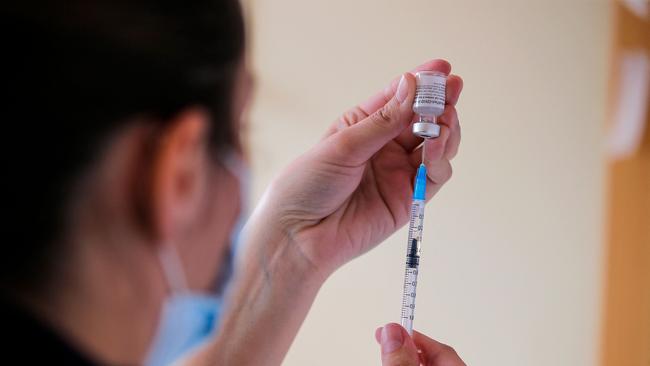
A Tasmanian department of health spokesman said the state had planned to have enough qualified people at the ready to administer the vaccine as the rollout ramped up.
“The Tasmanian Vaccination Emergency Operations Centre has developed a workforce strategy which includes using registered nurses, pharmacists, enrolled nurses and paramedics,’’ he said.
“This strategy has been built into our rollout planning and we are confident in our ability to work with the Commonwealth to ensure that the workforce in Tasmanian community clinics and general practice clinics will allow Tasmania to meet future demand as vaccine availability increases.”
Lt Gen Frewen also flagged a greater involvement with the business community, whose representatives he is meeting with Wednesday morning.
“Many of these industries already do flu vaccinations … they are used to vaccinating their workforce, it is another efficiency, and it also take burden off health care if necessary.
“It’s another way to accelerate the program,” he said.
Lt Gen Frewen also flagged an increase in advertising and public information campaigns, which have been heavily criticised for their lack of effectiveness.
Pfizer vaccine dose delay in some states
Meanwhile, Tasmanians receiving the Pfizer vaccine continue to be given doses three weeks apart, as the gap between jabs has almost doubled for three of the nation’s biggest states.
New South Wales has followed Victoria’s lead in adopting a six week gap between appointments for patients at state vaccination clinics, while Queensland said the second dose did not need to be given at exactly three weeks.
It can be revealed, however, some Pfizer patients in New South Wales are being given appointments seven weeks apart, in the latest hitch in the program.
And it comes as others are having to wait until November to get a first AstraZeneca shot through their GP even though we have an oversupply of that vaccine.
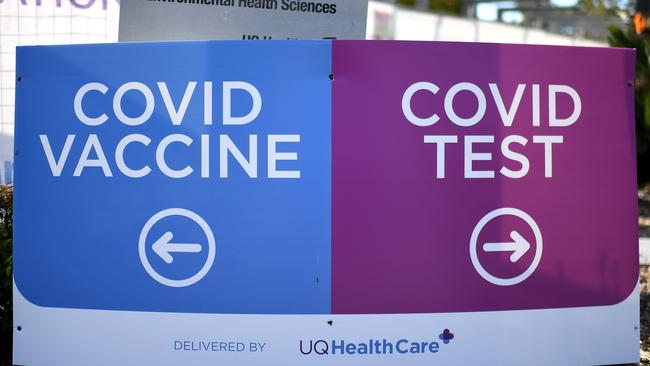
But in Tasmania, health authorities say those immunised with the Pfizer vaccine are getting their second jab within three weeks.
“Tasmania continues to manage its dose allocation to allow second doses to be delivered after 21 days,’’ a health department spokesman said.
In its advice to the government in February ATAGI said “the recommended interval between two doses of Comirnaty (Pfizer) is at least 21 days”.
To allow for logistic considerations such as vaccine supply “it is recommended to complete the two-dose course within six weeks”, the advisory body said.
Research shows the Pfizer jab was between 33 to 50 per cent effective after the first dose and 88 to 95 per cent effective after the second dose, given three weeks apart.
The downside of a longer wait was people were not fully protected until they had their second dose particularly against the Delta variant — which is dominant among cases in Australia.


